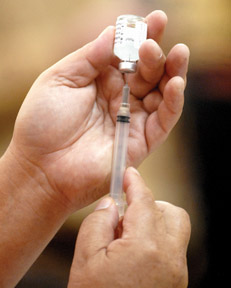Chickenpox. Hepatitis A and B. Measles. Polio. Tetanus. Whooping cough (or pertussis). What do they have in common? They are all vaccine-preventable diseases (VPDs). That means all of these diseases can be prevented with vaccines. No one has to suffer—or die—from them. We have safe, effective vaccines that have swept these diseases into the public-health waste bin in many parts of the world.
Or so we thought. VPDs have been in the news a lot recently. Measles may have been eliminated in the United States, but outbreaks of measles and other VPDs in under-immunized countries are only a plane flight away in today’s highly interconnected world. The measles outbreak that began at Orange County’s Disneyland in December 2014 is believed to have been caused by an unimmunized, infected international visitor to the park. This person spread the illness to other unimmunized individuals, who then spread it to even more unimmunized persons, resulting in more than 100 cases across 14 states and two countries. This outbreak reminded us that VPDs are preventable, but only when people get the vaccines.
One of the outcomes of the Disneyland measles outbreak was the passage of Senate Bill 277, which Gov. Jerry Brown signed into law on June 30. SB 277 eliminates the personal-belief exemption (PBE) that allowed parents to refrain from getting their kids vaccinated for any reason. This bill was necessary because communities with high rates of PBEs are also communities that experience VPD outbreaks, with the personal and financial burdens that accompany them. Fortunately, San Benito County’s PBE rate is just over 1 percent, which means that the new law will not significantly affect us.
Measles is not the only VPD in the news recently. You might be aware that we are currently experiencing another pertussis epidemic in California. Excluding the epidemic years of 2010 and 2014, we have had more pertussis cases (over 3,400) in 2015 than in any year since the 1950s. Four infants younger than 5 weeks of age have died of pertussis in California in 2014–2015. These infants became ill because they were too young to get vaccinated.
Infants rely on those around them to protect them. This is why it’s critical for pregnant women to get a Tdap booster during the third trimester of every pregnancy. Immunity passes from the mother to the child so that the newborns are protected until they can get their own immunization at two months of age. Adolescents are also at risk of pertussis, and a booster for incoming seventh graders has been mandated by California law since 2011. This means that many parents are currently preparing their children for school by shopping for backpacks and new clothes—and by making doctors’ appointments to get vaccinations.
In our immunization clinic, which serves children who are uninsured or have Medi-Cal, most incoming seventh graders need meningitis and human papillomavirus (HPV) vaccines in addition to pertussis. HPV vaccine provides an intriguing insight into a phenomenon known as “vaccine hesitancy,” which means that people are reluctant to get a vaccine for themselves or others. HPV is spread by sexual contact and is the most common sexually transmitted infection. Parents may be reluctant to give their children HPV vaccine because they are uncomfortable with the idea that their 11- and 12-year-olds will eventually engage in sexual activity.
But HPV vaccine is most effective when the three-dose series is given before sexual activity occurs. It’s important to remember that HPV is one of the few vaccines that prevents cancers. HPV causes cervical cancer in women and oral and anorectal cancers in women and men, all of which take years to develop. Therefore, a parental decision to give HPV vaccine to your pre-teen child today can affect his or her health years into the future—long after they have left your immediate care and protection. Whether to get HPV vaccine is really quite a simple question, with a simple answer: If you could give your child a vaccine that prevents cancer, wouldn’t you make sure your child got that vaccine?
I have been impressed by the thorough vaccine coverage I see in my clients’ health records. Our local schools have high immunization rates. I encourage all parents to continue this excellent work by asking about immunizations at every doctor’s appointment. And don’t forget that the flu season is coming up: Talk with your healthcare providers about getting flu vaccine for yourself and your family.
Watch local media for details of the public health department’s annual mass flu immunization clinic at the Veterans’ Memorial Building in Hollister on Nov. 19. Call your healthcare provider or the public health department at (831) 637-5367 if you have questions about immunizations.
Vaccinations are a win–win proposition: They protect individuals and the community. Get vaccinated!









